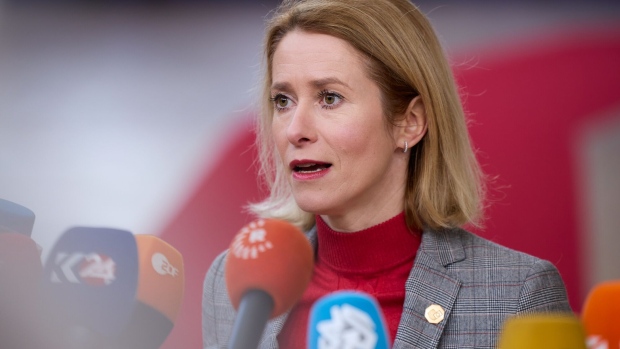Feb 14, 2024
Baltics Issue Travel Warning After Estonian PM Kallas Lands on Kremlin List
, Bloomberg News

(Bloomberg) -- Baltic nations warned their officials to weigh their travel plans after the Russian government added Estonian Prime Minister Kaja Kallas and other high-ranking officials in the region to a criminal database.
Estonia, Latvia and Lithuania reacted to a decision by the Russian Interior Ministry to place Kallas and others on its wanted list as part of charges against individuals involved in the Baltic nations’ decisions to dismantle Soviet-era monuments. Russia calls the act “desecration.”
“We have to take this seriously and to consider before traveling as well,” Lithuanian Foreign Minister Gabrielius Landsbergis told reporters Tuesday. The top diplomat and his two Baltic counterparts summoned their Russian ambassadors to protest.
Kallas, the first European leader to be placed on the Russian Interior Ministry list, dismissed the decision on Tuesday, calling it a “familiar scare tactic” that would have no effect. But on Wednesday, Estonia’s top prosecutor, Andres Parmas, said that the prime minister would have to factor in the risk that some countries might be ready to hand her over to Russia.
The Russian ministry’s list carries little international standing with such bodies as Interpol. Still, the Latvian government said travelers should consider travel outside the EU and NATO and assess the legal relationship with certain countries with Russia.
The three Baltic states — all members of the European Union as well as NATO — have stepped up the removal of Soviet monuments in the last two years in response to Moscow’s invasion of Ukraine. Russia has lashed out at what it’s called the Baltic nations’ attempt to foment hostility, including with significant Russian minorities in Estonia and Latvia.
Latvia’s government oversaw the toppling of an 80-meter (262 foot) Soviet monument in the capital Riga in August 2022, triggering a reaction from Moscow.
Flight From Kyrgyzstan
Russian Foreign Ministry spokeswoman Maria Zakharova said in a Telegram post that the list “is just the beginning.”
Since Russia’s invasion of its neighbor two years ago, the Baltic states, which were absorbed into the Soviet Union before reclaiming their independence after 1990, have been vocal in warning about the Kremlin’s aggression and calling for sanctions against Russia and aid to Ukraine.
Estonia’s intelligence agency warned that Russia could double its land and air forces near its border in the coming years, according to a report it released this week. The nation’s chief spy, Kaupo Rosin, was dismissive about the Russian move, saying that if anything it proved that the Baltic states’ muscular tactics were having an effect.
“Russia can put wanted notices of people in all kinds of databases, but I don’t see how it will really change our life,” Rosin said in an interview in Tallinn on Tuesday.
The Russian government’s list includes a broader group of ministers and members of parliament, all of whom can be impacted.
Vjacelsavs Dombrovskis, a former member of the Latvian parliament who voted for tearing down the Riga monument, said he was forced to flee Kyrgyzstan with the help of Latvian diplomats in September. Local police had sought his detention and extradition to Russia based on a request from Moscow, the ex-lawmaker said.
Kallas invoked her family history in referencing the decision.
“My grandmother and mother were once deported to Siberia, and it was the KGB who issued the fabricated arrest warrants,” she said in a statement.
--With assistance from Gina Turner.
©2024 Bloomberg L.P.







